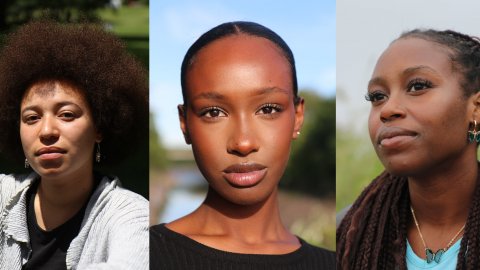
Jo Lansdowne Director of Research
on Wed 29 Sept 2021Black History Month 2021 at Watershed
Posted on Wed 29 Sept 2021
A few highlights of things happening during Black History Month which offer audiences an opportunity to engage with Black creatives and their stories
Black people have had their history written out – sometimes deliberately, sometimes systematically – of Britain’s story because it’s the history of slavery and empire and that doesn’t fit in with the comforting island story narrative. Black people were told that they had no history – Hegel said that Africa’s a place with no history – and that double act of erasure and denial meant that Black people had no story to explain why they were in Britain or how their relationship with Britain had been forged.
Black History Month is a moment to collectively highlight and celebrate African and Caribbean contributions to British society and culture which, as David Olusoga describes, are so often erased or overlooked.
Watershed aims to programme work all year round that is rich with diverse cultural perspectives and representative of the people living and working around us. This includes an ongoing commitment to working with and for the Black communities of Bristol and beyond. Here are a few highlights of things happening during Black History Month which offer audiences an opportunity to engage with Black creatives and their stories, both historical and contemporary.
From Fri 1 to Thu 7 Oct we will be screening the restoration of The Story of a Three Day Pass (1967) by Melvin Van Peebles who sadly passed away last week. Van Peebles was a one-man renaissance often writing, producing, directing, editing and scoring his films. His films, like the groundbreaking Sweet Sweetback’s Baadasssss Song (1971), would influence future generations - from Spike Lee to Ava DuVernay to Jordan Peele - and his indefatigable creative spirit is continued in his filmmaking son Mario Van Peebles. You can read more about Van Peebles and The Story of The Three Day Pass in this piece by Watershed’s Cinema Curator Mark Cosgrove.
From Tue 5 to Thu 7 Oct you can also watch No Place like Home by Director Perry Henzell. Almost fifty years after Henzell’s The Harder They Come (1972) put Jamaica on the cinematic map, the late director’s long-lost second feature at last achieves a cinema release. Reconstructed and restored, this definitive version of the film is both a love letter to Jamaica and a thoughtful examination of its changing culture. We are thankful to Twelve30 Collective (Jonathan Ali and Pervasive Media Studio resident Lisa Harewood) who are releasing the film in the UK. Jonathan, Lisa and Mark discuss that process, the film and the work of Twelve30 Collective more widely in this month’s Cinema Podcast.
“Amid the sweaty nightclubbing, the very 1970s lovemaking (Carl beds both Susan and a fresh-faced Grace Jones, making her debut), and the stunning scenery, No Place Like Home is a prescient look at the mixed blessing of the international tourist trade in the Caribbean.
“It also contains arguably the first cinematic validation of Rastafarian culture, and in a late sequence in which Henzell himself recites WB Yeats’ The Second Coming in voiceover, it delivers a stinging rebuke of the powers, both local and foreign, that had catastrophically mismanaged Jamaica’s post-independence development to that point. The denouement leaves no doubt as to where Henzell thought his country was headed, and sadly time hasn’t proven him much wrong.”
Jonathan Ali writing about No Place Like Home on the Twelve30 Collective blog
From Fri 8 to Sat 9 Oct (at St Agnes Park or Redcliffe Caves) you can experience the first prototype of Who is She, a project created by Nancy Medina and Chinonyerem Odimba. Using outdoor projection mapping and innovative technological tools, Who is She takes a deep dive into present imagined stories, and future possibilities of how Black women exist and are presented in Bristol. Supported through Bristol+Bath Creative R+D in which Watershed are a lead partner and presented as part of A National Conversation, a UK wide project produced by English Touring Theatre (ETT). Nancy and Chinonyerem say:
“The city becomes our canvas, and its history becomes a springboard. We want to have conversations about how public art can be a place for justice for those erased, and a place to assert ownership. Partnering with creatives and communities, we hope to create work that’s an exploration of our relationship to natural spaces, spaces charged with colonial history; and what it is to express ourselves through technology as Black artists.”
Throughout October you might also want to visit our online platforms which are host to a number of personal experiences of being Black in the UK today.
The latest issue of Container (the creative technology magazine we run in partnership with UWE Bristol) includes We Cannot Walk Alone, a recording of an event to share stories amongst four people with lived experience of the UK Home Office’s ‘hostile environment’ policies. As precarious migrants – undocumented individuals, asylum seekers and refugees – they face daily battles to access to services and support including Covid-19 vaccines and mental health care, and to remain in the country they call home. The panel co-created and co-produced the event, taking control of their own narratives. Over a period of months, creative technologist Wendy Lawn created bespoke Mozilla Hubs spaces for the event and worked with the panel to design avatars that represented themselves within a safe digital space.
Our youth platform Rife Magazine currently features recent resident Oona Chanfi’s Reflecting on June 2020: A Photography Series. In this photography interview series, Oona reflects on black peoples’ mental health, sense of identity and relationships during June 2020 and how this changed in the year that followed.
“[I felt] incredible, elated, so proud of Bristol. That was travelling throughout the world, the footage of Colston being brought down and pushed into that harbour, it was everywhere. It was the start, Bristol had started something, then other cities were doing it and it just felt like fucking yes. This is what we’re doing, grass roots shit.”
For more information, resources and events relating to Black History Month in Bristol visit the Black History Month website.

